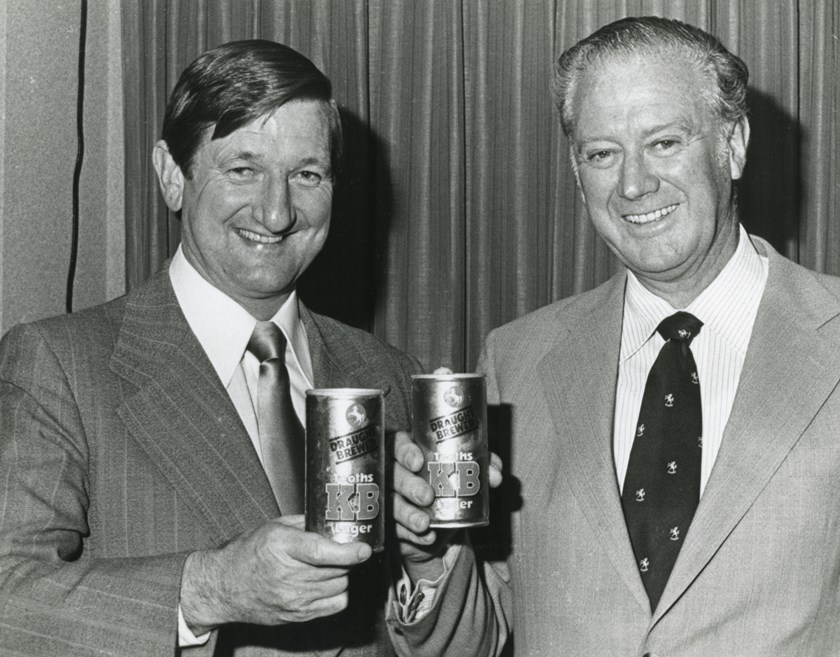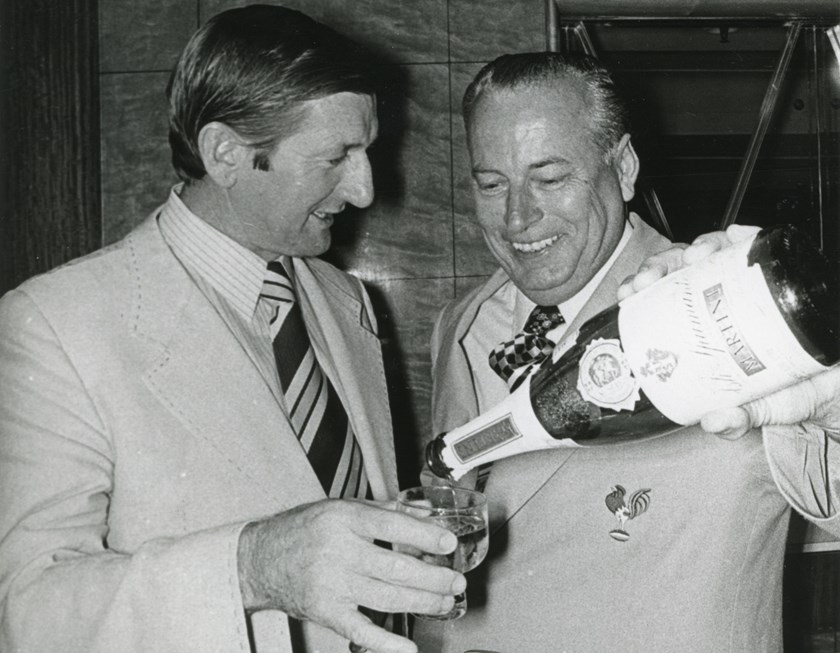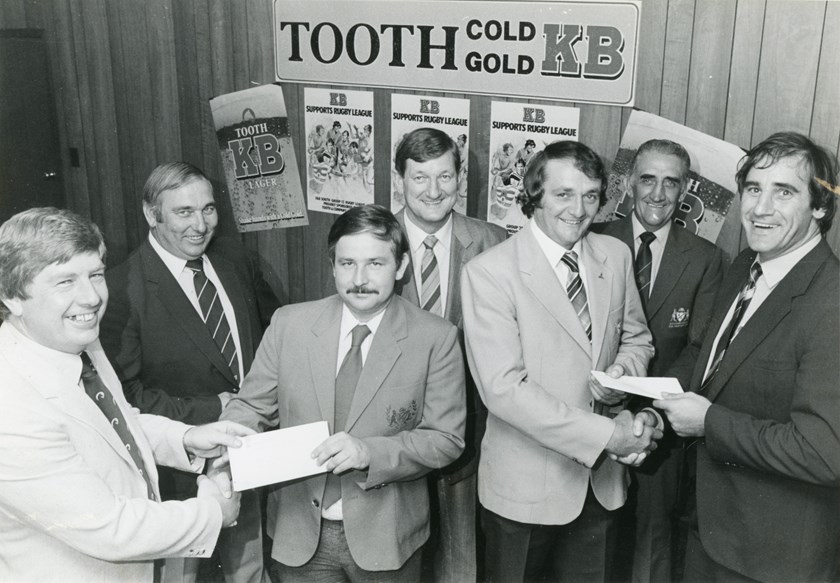Kevin Humphreys was a polarising character who presided as boss over the premiership during one of the most turbulent times in rugby league's history in Australia.
The former Balmain Tigers prop is remembered for the way in which he exited the role - resigning as president of the NSW Rugby League in 1983 in the wake of a Four Corners investigation which aired numerous allegations of financial impropriety.
His decade-long reign at the top of the game was marked by the modernisation of the sport, with the competition expanding beyond Sydney for the first time - to Canberra and the Illawarra - while two clubs were expelled - Newtown and Wests (which later won readmission).
However, his career was tainted by allegations of corruption and he fell on his sword after the ABC broadcast claims he had fraudulently obtained large sums of money during his days as secretary-manager of the Balmain Leagues Club.
He died in 2010 at the age of 80.
Titled "A Very Complex Man", this story first appeared in Rugby League Week on March 5, 1983, written by Ian Heads.
In one way Kevin Humphreys' career as a top Rugby League administrator ended as it had begun.

From the last word of his historic statement at NSW Leagues Club last Monday night, to the careful parrying of the questions that followed, Humphreys gave the impression that he was in charge.
He looked pale and drawn, but spoke confidently and strongly as he read out the words of his resignation ... words that must have been secretly tearing him apart.
Under his presidency Rugby League was catapulted into the 20th-century world of sporting commercialism.
Only at the end, when Ken Arthurson and Charlie Gibson shook his hand, and Humphreys withdrew briefly to his office, did emotions threaten to run away. But to the end, he was the man in charge - The Boss - as he had been throughout the 10 years of his regime.
Standing in the boardroom, my mind went back to my first glimpse of Kevin Humphreys, in February 1965.
I was at Balmain Town Hall the night he beat Mai Fallon for the job as secretary of the Tigers. That night he took charge immediately, taking the stage coolly and confidently to conduct the remaining ballots. He looked like an official on the "go".
Eighteen years later ill-health, and the sensational disclosures of a dramatic TV show, brought down the curtain on his career in Rugby League administration - a controversial ending to a controversial career.
History will judge the Humphreys era in a variety of ways.
As NSW and Australian Rugby League president for a decade, the continued the tradition of the men who went before - Bill Buckley and H. Jersey Flegg. Like him they were strong, dogmatic characters if you like - tough men in a tough game.
Humphreys continued that tradition. But little else in his reign followed the old tradition of the game.
Under his presidency Rugby League was catapulted into the 20th-century world of sporting commercialism.

A brilliant business negotiator — probably his most outstanding quality as League boss — he attracted millions of dollars to the game of Rugby League, linking the game with some of Australia's most respected companies.
He upgraded the status of players dramatically - turning them into first-class citizens.
Representative teams which once stayed in grotty "digs" on tour now travel in style, living in the very best accommodation.
Facilities at grounds improved dramatically under his direction - although not fast enough, or extensively enough, for Kevin Humphreys' liking.
Huge TV contracts, new rules, thundering Australian dominance of the international scene, were all elements of the Humphreys era.
The League moved fast. The "image" of the players and the game became a key issue.
He upgraded the status of players dramatically - turning them into first-class citizens.
Like any strong, magnetic leader, Humphreys gathered around him a coterie of faithful followers.
In the numbers game at the NSWRL he was a winner, assured always of bloc support when the chips were down.
But Kevin Humphreys will not be remembered as a popular president.
The court case of 1976, and his well-publicised connection with gambling in various forms, and gambling people, did no favours for his image.
Humphreys is the keenest of punters, with the racing game claiming a large slice of his sporting interest.
Ironically, communication was an area in which Humphreys fell down. Because he is a gifted speaker, a confident off-the-cuff orator who says what he means, and says it well. But Humphreys and the NSWRL failed in communication with the "little people".
The League are notorious for not answering letters, and their PR image with many people has suffered as a result.
An air of secrecy about the NSWRL, and talk of the Humphreys "cartel", was also damaging to the image.
A good deal was done "in club" at the NSWRL, pressmen were excluded from meetings when the general committee went "in camera" - a break with the tradition of recent years.
None of that helped the League's image - or as a result the image of Kevin Humphreys, the man in charge.
Humphreys was not an easy man to know. I "knew" him as an administrator for 18 years, but, I'm sure, never really knew him. His relationship with the press fluctuated, from harmonious to wary and withdrawn.
Nothing strange about that. He was often a man in the hot seat, defending at times his own actions, and defending the game he loved.
That is the point that is in absolutely no dispute about Kevin Humphreys. He was, and is, a true, red-blooded Rugby League man, from top to toe.
The Rugby League flame has burned brightly in him since 1950, when he first pulled on the black and gold of his beloved Balmain.
For all my mixed feelings about Kevin Humphreys the NSWRL president and Kevin Humphreys the man, I really felt for him last Monday night.
The strain of the previous days, and the worrying decline in his health, had taken their obvious toll.

In getting out, I believe he did the right thing. Life won't be easy for a time for the Humphreys family - Kevin, wife Joan and sons David and Stephen.
Hopefully, with the weight lifted, Kevin Humphreys' health will improve.
His decision to leave the game was done in the typical Humphreys style. It was a solitary decision, although his friends advised him ... one way and the other.
Finally, he called it a day for the reason that mattered most of all to him. For the good of Rugby League.



